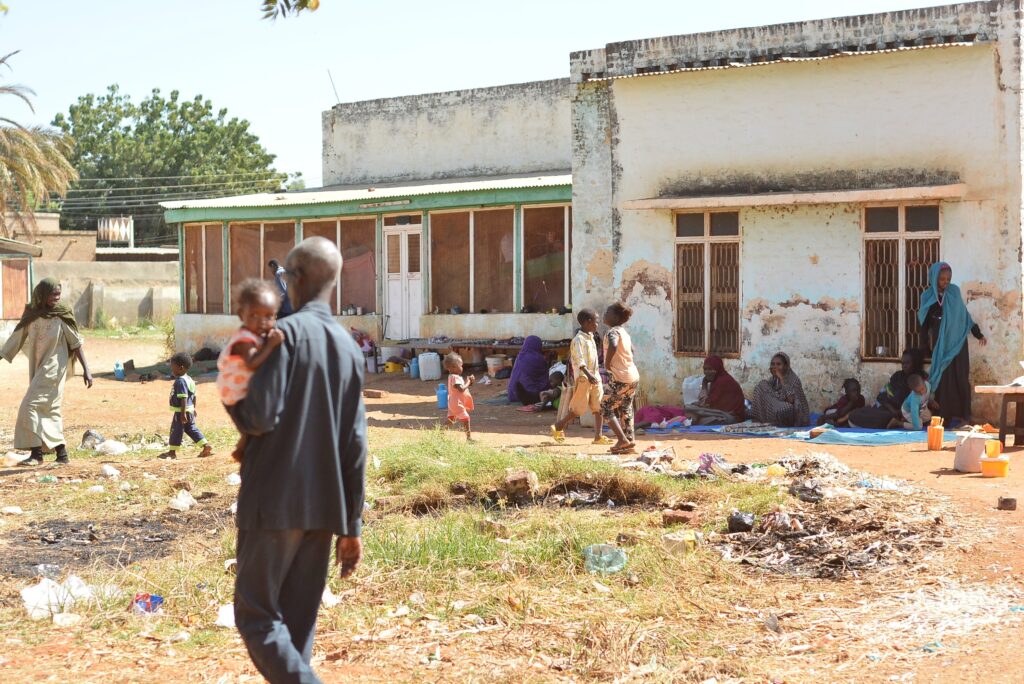On 15 April 2023, the lives of millions of Sudanese people were brutally ripped apart.
Fierce street battles broke out in the usually peaceful capital city of Khartoum. Families fled as bullets and shells tore indiscriminately through heavily populated neighbourhoods and bodies piled high in the streets.
Since then, a tornado of chaos has engulfed Sudan.
Read our new report on 1 year of the war in Sudan.
The war has spread to almost every corner of the country – turning urban neighbourhoods into rubble, destroying infrastructure and public services, and burning villages to the ground. Markets and hospitals have been attacked and fighting has affected many of the main agricultural regions.
Now, Sudan is on the verge of famine, with children starving to death. It is too dangerous for many farmers to access their fields and this year’s harvests are projected to be among the worst ever. The economy is collapsing at a staggering rate, pushing many families deep into poverty at a time when food prices are also rocketing. Much of the health system is destroyed and deadly diseases are spreading. Thousands of people have been killed and 24.8 million people – almost half the entire population – now need humanitarian assistance.
Islamic Relief’s team warns that there is a very real and growing risk that Sudan could collapse as a functioning state, which would have enormous regional and global impact.
Craving home and peace
The war has created the world’s largest internal displacement crisis, with 8.4 million people forced to flee their homes. 2 million of them are children under 5 years old.
Among the millions of displaced people are 23-year-old Gesma and her young children, who ran for their lives as bullets whizzed around their small house on the edge of Khartoum. Gesma’s husband was out at work in the market, and she hoped to reunite somewhere safer. But she never heard from him again and doesn’t even know if he’s still alive.
Gesma was heavily pregnant when she escaped Khartoum and a few months later she gave birth to twins in a sprawling camp in eastern Sudan. She named them Watan (meaning Home) and Salaam (meaning Peace) – 2 things that millions of people in Sudan crave more than anything else but remain out of reach.

Sudanese communities are renowned for their generosity and impoverished families have given shelter to many of the displaced people – sharing their homes, food and water with them.
Islamic Relief CEO Waseem Ahmad says: “As rich nations increasingly shut their borders and cut international aid, it is both humbling and heartening to see the generosity of some of the world’s poorest communities.
“I’m inspired by our staff in Sudan who have suffered so much but remain dedicated to helping their country. Most of them have made perilous journeys to flee their homes and have lost relatives and friends. Sudan has become one of the most dangerous places to be a humanitarian worker. But despite the dangers, it is possible to deliver aid and Islamic Relief’s team has saved countless lives.”
A fatal lack of attention
Thanks to donations from all over the world, Islamic Relief has reached more than 600,000 people across Sudan with vital aid – providing food to families at risk of malnutrition, supporting overwhelmed health facilities, and providing hygiene and dignity kits to displaced women.
But the scale of the crisis means that much more is needed. The violence recalls the atrocities 20 years ago, when the crisis in Darfur – in western Sudan – became the most prominent in the world. Global leaders convened summits, A-list celebrities led huge public rallies, and eye-witness reports made TV headlines and front pages.
In comparison, today’s crisis is being forgotten or ignored.
This lack of attention has deadly consequences. A quarter of the way through the year, the UN-led 2024 Humanitarian Response Plan for Sudan has received just 5% of the $2.7 billion it needs. The 2023 appeal ended up less than half funded.
After a year of unimaginable horror, the people of Sudan urgently need more international attention and support.
In a new report Islamic Relief is calling for renewed efforts to secure an immediate ceasefire and a negotiated political settlement. Civilians must be protected. Parties to the conflict must ensure safe humanitarian access to people in need, and international governments must step up humanitarian assistance to prevent a catastrophic famine.
Islamic Relief continues to support vulnerable people in Sudan at this time of greatest need. Please help us to continue this life-saving work. Donate now.










